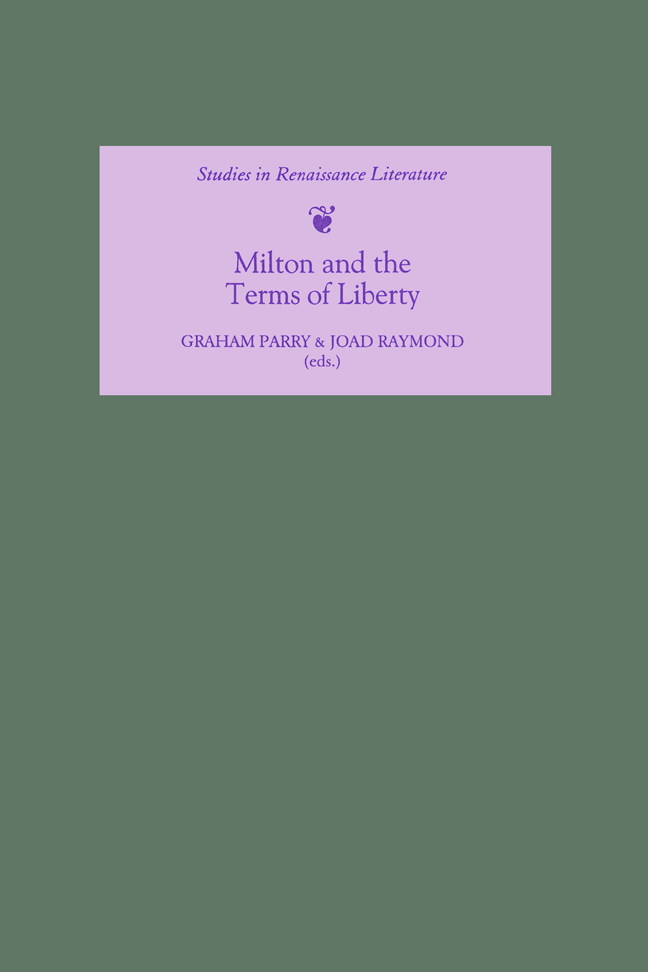Book contents
- Frontmatter
- Contents
- Contributors
- Acknowledgements
- Introduction
- 1 John Milton and the Politics of Slavery
- 2 Milton before ‘Lycidas'
- 3 Prosody and Liberty in Milton and Marvell
- 4 'In These Western Parts of the Empire': Milton and Roman Law
- 5 The King is a Thing
- 6 'in time of Warre … our Language is all corrupt with military Tearms': The Politics of Martial Metaphors in Post-regicide England
- 7 Alexander More Reads Milton: Self-representation and Anxiety in Milton's Defences
- 8 Stylometry and the Provenance of De doctrina christiana
- 9 The Figure and the Ground: Samson as a Hero of London Nonconformity, 1662-1667
- 10 The Publication of the King's Privacy: Paradise Regained and Of True Religion in Restoration England
- 11 'To try, and teach the erring Soul': Milton's Last Seven Years
- 12 Pandemonic Panoramas: Surveying Milton's ‘vain empires’ in the Long Eighteenth Century
- Index
- Studies in Renaissance Literature
6 - 'in time of Warre … our Language is all corrupt with military Tearms': The Politics of Martial Metaphors in Post-regicide England
Published online by Cambridge University Press: 15 February 2024
- Frontmatter
- Contents
- Contributors
- Acknowledgements
- Introduction
- 1 John Milton and the Politics of Slavery
- 2 Milton before ‘Lycidas'
- 3 Prosody and Liberty in Milton and Marvell
- 4 'In These Western Parts of the Empire': Milton and Roman Law
- 5 The King is a Thing
- 6 'in time of Warre … our Language is all corrupt with military Tearms': The Politics of Martial Metaphors in Post-regicide England
- 7 Alexander More Reads Milton: Self-representation and Anxiety in Milton's Defences
- 8 Stylometry and the Provenance of De doctrina christiana
- 9 The Figure and the Ground: Samson as a Hero of London Nonconformity, 1662-1667
- 10 The Publication of the King's Privacy: Paradise Regained and Of True Religion in Restoration England
- 11 'To try, and teach the erring Soul': Milton's Last Seven Years
- 12 Pandemonic Panoramas: Surveying Milton's ‘vain empires’ in the Long Eighteenth Century
- Index
- Studies in Renaissance Literature
Summary
THE inclination of the Times do much confer to the variation of the Style: And as in Times of Peace, all our metaphors (for example) are deduc'd from peacefull Arts: So in time of Warre (we have had but too sad experience) our Language is all corrupt with military Tearmes.' Writing in the 1650s, Richard Flecknoe was commenting on how language was fashioned by political context, and particularly on how the recent civil war had infiltrated and transformed rhetorical expression. This essay will examine how these martial ‘tearmes’ functioned at a revolutionary moment in English history – 1649-50 – as a means of conveying the hard-line political positions that Royalists and pro-Commonwealth writers adopted immediately following the regicide.
Each side had its reasons for producing a rhetoric of irreconcilable difference. Milton used military language in Eikonoklastes to publicly engage with the literary enemy – Charles I in particular – through polemic discourse. This strategy was designed to finish off rhetorically a Royalist cause whose supporters, while defeated on the battlefield, had persistently engaged in physical and verbal acts of defiance: assassinations of diplomatic envoys of the new Commonwealth occurred alongside the printing of texts such as Eikon Basilike. Milton's metaphors matched the uncompromising political sentiments expressed in pro-Commonwealth pamphlets and newsbooks. Their response to recent acts of Royalist insurgency indicated the Common- wealth's anxiety about its inability to establish a stable government de jure rather than de facto. This discomfort was well-founded. While the Royalist reaction to the regicide produced a complex series of literary responses that focused on whether accommodation or resistance was the best policy, many writers determined that a challenge to the new Commonwealth was the only option. Two writers, Sir William Davenant and Christopher Wase, used military metaphors in ostensibly apolitical texts. One was a preface on the heroic poem (Gondibert, 1650) and the other was a translation of a Greek play (Electra, 1649). Both offered a discourse of subterfuge for the Royalist party. The seemingly exclusive literary nature of their texts – a discourse about the function of translation and commonplace commentary about the value of literary models – was couched in the language of spies, cabals, agents and ambushes. These apposite metaphors suggested that a military response was still viable despite the regicide: it would take almost two years until the Royalists would be decisively defeated at the battle of Worcester.
- Type
- Chapter
- Information
- Milton and the Terms of Liberty , pp. 95 - 110Publisher: Boydell & BrewerPrint publication year: 2002

